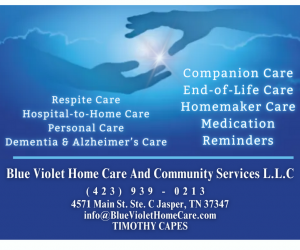LACIE SILVA
Editor
In regards to public comment sections, a new law mandated by the government and passed in Tennessee last year came into effect on July 1. According to Gouger, this law requires all local government bodies to include an agenda item for public comment, with the stipulation that the comments must be relevant to items on the agenda. Specifically, individuals sign up to speak on current agenda items during the comment section, while the “future comments” section was introduced for Marion County Commissioner (MCC) meetings.
Both sections serve distinct purposes, with “Future Comments” facilitating further discussion among commissioners and allowing them time to address citizen concerns before the next meeting. Additionally, individuals wishing to speak on current agenda items are permitted to sign up before the meeting, providing their name and the agenda item they wish to discuss. However, if the item is not on the agenda, it is deemed irrelevant to the public comments section but can be raised in the Future Comments section. Additionally, individuals retain the option to request inclusion on the agenda itself, they need only contact their district commissioner.
Gouger elaborated on the rationale and guidelines for each section designated for public comments, while Hargis noted that the boards had been functioning with the existing comments section for over 30 years. Hargis acknowledged that historically, all comments had been permitted, and individuals desiring to speak had always been accommodated. However, in response to the strong disagreement expressed by the audience, Hargis clarified that he was referring to past practices. He then directed a question to a former commissioner present at the meeting as an audience member, prompting the commissioner to acknowledge that while everyone had been allowed to speak previously, accommodating 30 people for a single item was excessive and had not occurred before.
Franklin proposed moving forward with the meeting’s agenda and advised individuals with concerns to reach out to the Rules Committee for further discussion.
A concerned citizen named Dave Thompson addressed the board, expressing his efforts to contact three different commissioners regarding the Freedom of Information Act. Thompson voiced his frustrations at not receiving any responses and suggested implementing a mini public comments section after each agenda item, allowing audience members to speak on topics they deemed necessary. He emphasized the importance of enhancing communication channels to ensure that opinions and information from citizens are heard and considered before commissioners make final decisions through votes.
During the discussion, Attorney Gouger referenced previous deliberations in the rules committee meeting, expressing uncertainty about whether all commissioners were informed of those discussions. He mentioned the hope for an additional agenda item allowing the public to briefly address matters not originally listed, acknowledging the unpredictable nature of meeting discussions until they occur. Attorney Gouger deferred to the chair’s decision but suggested that if Ms. Miland wished to speak on a topic discussed during the meeting, she should be given the opportunity to do so after the matter was introduced by the mayor or commission. He noted that the public comment section had previously been at the end of the meeting but was moved to the beginning to address issues arising from comments made after decisions were already made. Attorney Gouger further advised it had been proposed the consideration of an additional section, distinct from the public comment section, to allow public input at the end of meetings on non-agenda items.
Further discussion and information regarding future public comments will be made available as it comes to light.
The Marion Tribune – May 2, 2024










